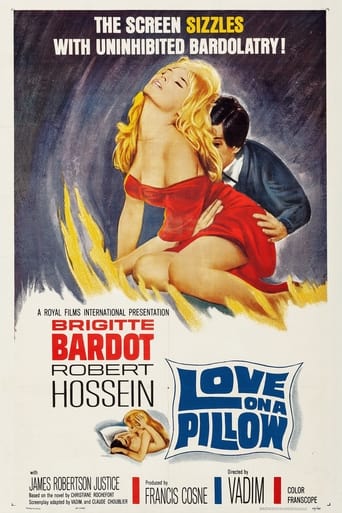eldoradofilm2
One of the few mainstream films I ever saw dealing with a manic-depressive. Which is a disease, the guy is not "just crazy" or "abusive". Anybody who knows about depressions (clinical) will appreciate the film. Of course it is not perfect, her falling in love with him could have been done a bit more believable, Vadim is no Antonioni, but still I like it a lot. In the USA Easy Rider was one of the first films where people smoked pot ("without raping a nurse" as Dennis Hopper stated), Vadim showed it almost 6 years earlier! He was quite hip and brave to make the film, dealing with a mental disease which is still under the carpet 50+ years later, in the first place. Not many people care for depressive persons. His ex-wife BB had some understanding as well of course, she tried to kill herself a year before the film was made.
Claudio Carvalho
When the Parisian bourgeois Geneviève Le Theil (Brigitte Bardot) travels to Dijon to resolve issues in the inheritance left by her wealthy aunt, she mistakenly opens the door of another room in the hotel, finding a suicidal near death on the bed. Later Geneviève goes to the hospital and is introduced to Renaud Sarti (Robert Hossein), the nihilistic alcoholic vagrant she saved. Geneviève falls in love for Renaud and brings him to her apartment in Paris, initiating a destructive, masochistic and corrupt relationship with the abusive man."Le Repôs du Guerrier" has a great premise – a conservative woman falling in love for a destructive man that corrupts her in a masochist relationship. The story is long, disclosing many abusive and humiliating situations that Geneviève is exposed in an erotic way, considering that this is a movie of 1962. For example, the orgy in Katov's apartment is not explicit but it is very clear that the participants are having sex, using drugs and drinking booze. However, Roger Vadim's option for a corny conclusion gives the sensation of a melodramatic soap-opera and spoils the dramatic and crude romance. My vote is four.Title (Brazil): "O Repouso do Guerreiro" ("The Warrior's Rest")
rooprect
The title of my review ought to be enough to scare off the folks who are expecting a plot-driven, digestible story. You'll get none of that here.Although there is indeed a plot (a rather interesting one, if you ask me), the power of this film lies not in the story but in the script and in the subtle, almost indecipherable fragments of philosophy we experience through these two highly complex characters.Geneviève (Bardot) is the the romantic. Her counterpart Renaud (Hossein) is the cynic. The collision of their worlds causes a catastrophic upheaval in both of their lives. But it is undeniable that they need each other, just as the two opposing philosophies rely on each other. Sort of a yin-yang thing. At times they are at war with each other; at times they cling to each other for life; at times they threaten to annihilate the other absolutely. This is some really heavy stuff that cannot possibly be summarized in a few paragraphs, so I won't even try.There are several monologues which are so stirring I want to learn them by heart. Particularly the last two speeches in the final 10 mins of the film. Pay close attention to those words, because they sum up the entire theme of the film. Powerful. Powerful.
alice liddell
This film's interest lies less in its indifferent, sweetly bourgeois bourgeois-baiting, than in its dramatisation of Vadim's mind, his sense of power in having 'created' Bebe; his emasculation as she transcended and abandoned him. This schizophrenia is given the revenge treatment here as Bardot navigates a liberating plot, eventually escaping stifling social respectability and imperiously mastering sadistic lover. This is filmed, however, in a fetishistic way, diminishing her sexual power, while leaving her nakedly vulnerable to the masculine gaze.


